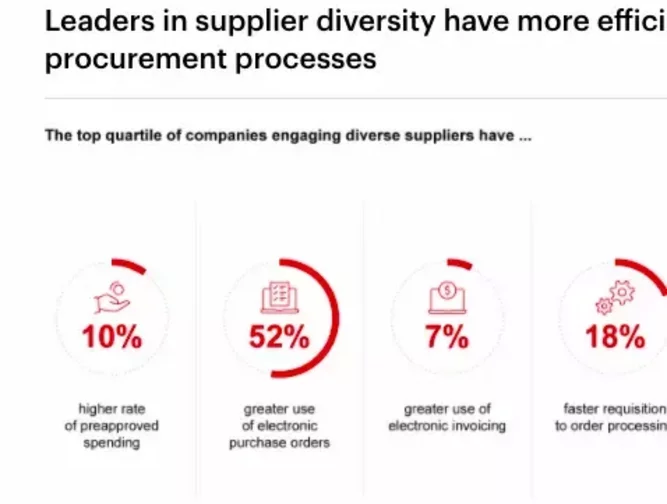Why investing in diverse suppliers is good for business

Triggered by last summer’s wave of protests against racism across the US, an increasing number of organisations have increased their engagement with businesses owned by under-represented groups, including Black people and women.
In fact, the commitments to diversify supply chains by America’s corporate giants have been staggering of late.
Race riots kicked off commitments to diversity
Since last year’s summer protests, Wall Street giant Citibank announced it was exclusively working with four Black-owned investment firms for a strategic US$2.5bn bond issuance; Unilever committed to a US$2.43bn annual spend with diverse suppliers by 2025; and telecoms giant Vodafone committed to evolving its vendor assessment criteria to give significant weighting to its suppliers’ commitments on diversity.
But that’s not all. CBRE announced a US$3bn commitment to supplier diversity; General Motors doubled its commitment to spending with Black-owned media to 4% of its ad budget in 2022 with a target of reaching 8% by 2025; and Target promised to spend more than US$2bn with Black-owned businesses by 2025, including adding more products from companies owned by Black entrepreneurs, spending more with Black-owned marketing agencies and construction firms, and introducing new resources to help Black-owned vendors navigate the process of creating products for a mass retail chain.
Some companies, like Target, UPS and Pacific Gas and Electric, were already building more diverse supplier pools and have been doing so for decades. But, in recent years and certainly in the last 18 months, there’s been a very real increase and the data bears this out.
Recent research from Bain & Company reveals that spending on suppliers that are more diverse rose 54% between 2017 and 2020. So, what’s leading to this increase? And does it mean that executives are finally seeing that diversifying supply chains is good for business?
Good for society, good for business
Well, in short, yes. Bain’s report, with data provided by Coupa, reveals that the companies in the top quartile of spending on diverse suppliers saw an average of 0.7 percentage points more savings off total procurement expenditures, compared to their peer group. The report further points to tangible advantages of diverse supply chains, including a higher annual retention rate, to the tune of 20+ percentage points.
That there is business value in having diverse supply chains is something Bain’s Procurement practice has thought for some time, but now the data bears this out, with procurement officers increasingly finding business value in such diversification.
According to Andrea Greco, CBRE’s Chief Procurement Officer, “having a diverse supplier pool drives competition and promotes innovation through the introduction of new products, services and solutions”.
Why recognising supply chain diversity as business objective is important
Companies are starting to think of the journey to global supply diversity as one that relates to business performance, rather than just a social initiative, and this pivot in thinking is what ultimately will lead to success. Why? Because businesses will then look to incorporate supplier diversity into the procurement process.
In the past, explains Donna Wilczek, SVP of Product Strategy and Innovation at Coupa, decisions related to diversity, equity and inclusion were happening in silos, which makes it “difficult for organisations to realise their full impact”.
However, by embedding supply base diversification practices within the spend process, it can maximise business and societal impact in concert, she says.
Take Target. The retail giant integrated its supplier diversity goals into its commercial strategy and this has helped the company double spending on diverse Tier 1 and Tier 2 suppliers to US$2 billion between 2016 and 2019. When Target organises and hosts events to identify diverse businesses for specific product lines, for example, procurement staff help potential suppliers get certified and grow.
According to David Schannon, who co-leads Bain’s Procurement practice in the Americas, when “companies stop thinking of diversifying their supply base as a standalone initiative and start to recognise the benefits of investing in under-represented groups, we see meaningful business improvements”.

What's stopping all companies from doing it?
So, why isn’t every company getting in on the diverse supply chain action? Well, according to Bain & Company, there are a number of key challenges that companies need to overcome in order to boost spend with diverse suppliers. Here are a few:
- Stop thinking of diversity as a standalone initiative Many leadership teams eager to embrace supplier diversity limit their efforts to a series of short-term strategic sourcing events. This approach won’t address the long-term engagement required to develop a sustainable pipeline of diverse suppliers. For example, it typically takes 12-to-18 months to fully qualify a new supplier.
- Make sure the organization is aligned from the board to the business unit Boards make strong commitments to increasing supplier diversity but may overlook vital changes in the day-to-day decisions that are critical to implementation. Business units need a mandate to channel procurement spending to a new set of unknown suppliers — and a clear sense of how diversity goals stack up against other competing priorities.
- Don’t assume success will happen without resources One of the key reasons supplier diversity initiatives flounder is that organizations underinvest in the capabilities required to support new or developing suppliers, including onboarding, risk mitigation and mentoring.
- Expand goals beyond Tier 1 spending and suppliers A narrow focus on Tier 1 spending restricts the ability to grow a diverse supplier ecosystem and may render company targets unsustainable. It also reduces the full potential benefits of working with a diverse supplier group, including collaboration and innovation as well as access to new markets, customers and services.






